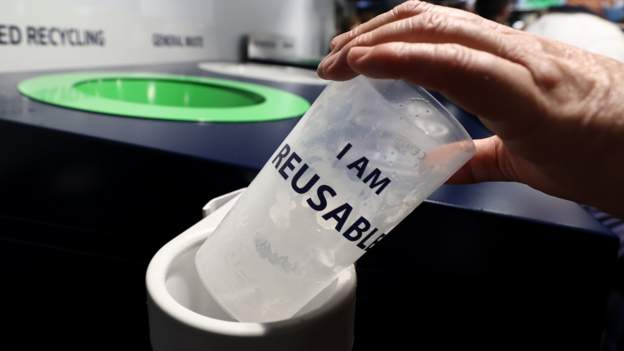If you notice footballers wearing green armbands during Premier League, EFL and Women’s Super League games on Saturday and Sunday, it’s all part of the Green Football Weekendexternal-link – with some clubs, players and fans involved in tackling climate change by reducing their environmental impacts.
BBC Sport looks at what’s going on.
Brentford defender Ben Mee has been a leading voice in the Premier League on these issues for some time, telling BBC Sport: “I became interested in reducing my carbon footprint mainly from having children, and thinking about what the future could look like for them.”
Heart of Midlothian and New Zealand forward Katie Rood has been encouraging her team-mates to stop using plastic water bottles and to consider vegan options, and said: “We’ve got one world, one planet, and I think often we are detached from the impacts and potential harm to the planet when we make decisions in our day-to-day lives.
In a quirk of the fixture list, perhaps the two most involved players meet on Saturday when Funso Ojo’s Port Vale play Wycombe Wanderers, with their midfielder David Wheeler announced this week as sustainability officer for the Professional Footballers’ Association,external-link the players’ union.
Ojo has clocked up more than 260 activities that Green Football Weekend organisers say could amount to more than 500kg CO2e saved – roughly the same as a return flight from London to Cairo.
“I’ve not always been such a green activist,” he said. “I used to drive a Porsche, but I changed. I told the club I want to get into an electric scheme, about a plant-based diet, the plastic bottes we were using.
“Since I switched to my green journey, I have been passionate about it. I am in a position where maybe there are hundreds of people looking at us, maybe it’s five people, but it’s small changes.”
Some fans have also been driving change at their clubs.
Burnley fan Cat Jebson set up a group called the Sustainable Clarets.
“It basically started with a couple of emails about vegan options and what we could do and I was really pleasantly surprised by how fast and how thorough the club were in their response,” said Jebson.
Burnley have welcomed the involvement of the group, seeing it as a “critical friend”, and Jebson says: “What we can do is put it even more in the Burnley context. Why it’s really important for the town.
“Disproportionately, climate change affects poorer people more. So it is a problem that we need to address right at the very top of the Football Association, even the government.”
Elsewhere, it was a fan who led Southampton’s first team to get rid of plastic bottles from the dugout on matchday, while Everton have created a fans’ forum and Everton for Change group, which is led by supporter Chris Halsall.
Environment manager Halsall now gets to combine his professional skills with his passion for his club, saying: “The new stadium will provide the club with a massive step-up in environmental performance. I’ve been able to stay up to date with all the environmental considerations within the design and build process. Ultimately our challenge to the club is to become net-zero.”
Travel is an important area, with much of the spotlight on the fact the majority of top teams still regularly take domestic flights, over very short distances.
This weekend, Liverpool will be travelling to their match at Wolverhampton Wanderers in a coach that will be powered by “sustainable fuels”, with an emission saving of 90% on a normal diesel coach. Tottenham Hotspur’s team coaches will be powered by bio-fuel, which is the case for all of their home games.
Fan travel is the largest part of sport’s footprint, and Norwich City are encouraging supporters to use E-bikes to get to the ground for their match against Burnley, while Carlisle United are organising a walk to the ground for the game against Harrogate Town.
While clubs, players and fans do their bit, there are ongoing questions for those at the top of the game both domestically and internationally about whether football is making enough progress in its efforts to properly address its emissions and relationship with the environment.
The game is growing. Uefa is expanding European competitions, Fifa is doing likewise for both the men’s and women’s World Cups, and Premier League clubs still fly huge distances on pre-season tours, and many take planes to domestic games.
Freddie Daley is a researcher at the University of Sussex, and specialises in football and the environment.
“Flying will continue to be a crux for football’s sustainability push,” said Daley.
“The trend towards playing more games in a season, and holding bigger international tournaments, requires vast amounts of air travel for both players and fans.
“This isn’t just the remit of clubs. Leagues can play a leading role in adjusting the fixture schedule so clubs can make use of lower-carbon modes of transport and do not have to rely on short-haul flights.
“There’s also the optics. The psychology of sustainable behaviour change emphasises the importance of leadership and integrity in getting people to adopt lower-carbon lifestyles.
“If fans see teams jumping on planes instead of a two-hour train journey, it can damage the message that we all need to take action to address the climate crisis.
“Worse still, if a football club is making public statements about the need to address climate change and asking its fans to shift their behaviours, but then uses short-haul flights, it verges on hypocrisy.”
Campaigners are also using Green Football Weekend to question the sport’s relationship with money from fossil fuel companies, whether that be via club ownership, the staging of events or sponsorship.
Frank Huisingh, from Fossil Free Football, wants to see restrictions on advertising and sponsorship.external-link
“Young football players, like their fans who follow their every move, live in the era of a rapidly escalating climate crisis,” he said. “It is unfair to ask young players to be a running billboard for big climate polluters threatening their future.”
It is expected the many small actions by fans, clubs and players across Green Football Weekend will combine to make a significant cut in emissions, and the hope from organisers is there will be a legacy which sees that continue.
Green Football Weekend’s Sarah Jacobs said: “This isn’t a one-off. It’s about driving ongoing conversation and action on climate, galvanised by an annual moment that brings together the whole footballing community – a moment we want to see grow in ambition and scale.”




